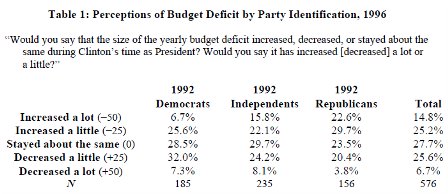Shorter Krugman: The fact that people say they are worried about the deficit does not mean that there is a political benefit to low-deficit policies. Voters don't know what the deficit is or how it came to be... it's just an abstract attitude. On the other hand, voters want a good economy and services
for real. Despite their ostensible concern over the deficit, voters
actually vote for increased services and a better economy. Reducing the deficit is thankless because voters will not note it and not believe it.
If things go bad for Dems going forward it will be because we have spent too little, not because we have spent too much.
If a deficit falls in the forest…Matt Yglesias makes a good point:
A lot of politicians and political operatives in DC are very impressed by polling that shows people concerned about the budget deficit. I think it would be really politically insane for people to take that too literally. If congress makes the deficit even bigger in a way that helps spur recovery, then come election day people will notice the recovery and be happy. If, by contrast, the labor market is still a disaster then people will be pissed off. It’s true that they might say they’re pissed off at the deficit, but the underlying source of anger is the objective bad conditions.
But the political argument against focusing on the deficit is even stronger than he realizes — because there are very good odds that even if Obama exhibited iron fiscal discipline, voters wouldn’t notice. There’s a remarkable, depressing paper by Achen and Bartels that includes an analysis of voter views of the deficit in 1996 — by which time the huge deficit that Bill Clinton inherited had been drastically reduced. Here’s what voters thought they knew:

Yep: after one of the biggest moves toward budget balance in history, a majority of Republicans, and a plurality of all voters, believed that deficits had increased. Not to put too fine a point on it: if Obama succeeded in reducing the deficit, would Fox News or the Washington Times report it?
The truth is that the truth about budgets plays almost no role in real politics. Right now, Meg Whitman is campaigning for Governor of California on the claim that state spending has exploded over the last decade — when the fact is that it has fallen drastically in real per capita terms. Will she pay a price for this? Probably not.
So if I were a politician, I’d focus on providing real improvements in peoples’ lives, rather than seeking deficit reductions the public won’t even hear about.http://krugman.blogs.nytimes.com/2009/10/30/if-a-deficit-falls-in-the-forest/